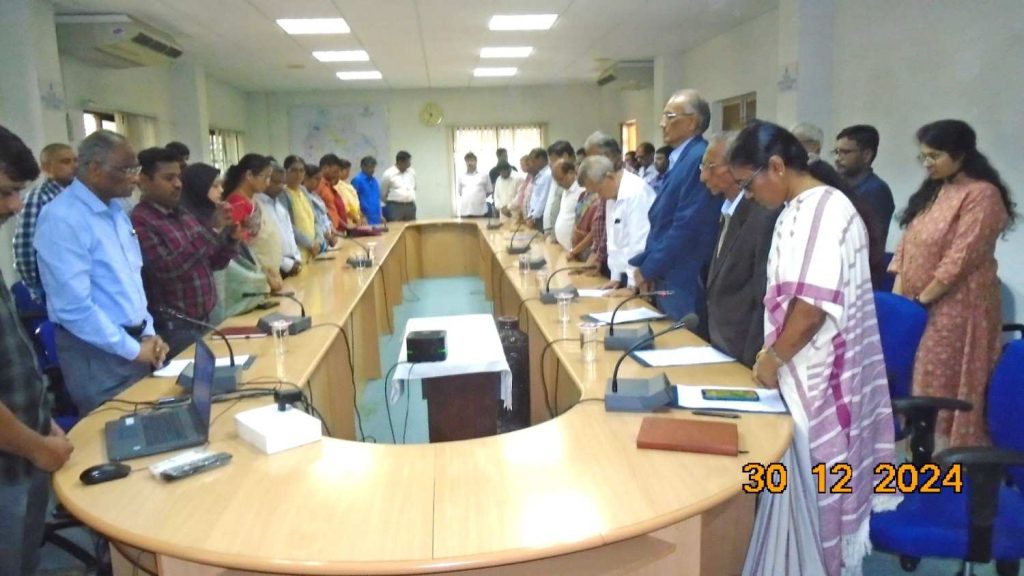
The Centre for Economic and Social Studies (CESS), Hyderabad, held a condolence meeting in memory of Prof. Manmohan Singh, former Prime Minister of India, on Monday, 30th December at 10:30 AM. The meeting was chaired by Prof. CH Hanumantha Rao, Founder Member & Honorary Professor, CESS.
The meeting was attended by Prof. J. Mahender Reddy, Founder member CESS, Dr. G. R. Reddy, Founder Member CESS, Prof. E. Revathi, Director CESS, faculty members, staff, research scholars, and media representatives.
Prof. E. Revathi led the gathering in offering floral tributes and observing a one-minute silence. In her address, she paid tribute to Prof. Manmohan Singh, who passed away on the evening of 26th December 2024. She remembered him as a distinguished economist, academic, bureaucrat and statesman. Prof. Manmohan Singh served as the Finance Minister of India from 1991 to 1996 under the PV Narasimha Rao Government and as the Prime Minister of India from 2004 to 2014 during the UPA Government.
Prof. Revathi highlighted his role as the chief architect of the economic reforms of 1991. She recalled CESS’s association with Prof. Manmohan Singh, noting his inauguration of the Silver Jubilee celebrations of CESS in January 2006. The BPR Vithal Auditorium at CESS was also inaugurated by him. During the event, Prof. Manmohan Singh commended the establishment of social science research centres and underscored the importance of research in shaping policy debates. He stressed the responsibility of social scientists to engage with public opinion and contribute knowledge to inform public policy decisions.
Prof. C.H. Hanumantha Rao, in his own words, stated:
Professor Manmohan Singh was a source of inspiration at the Delhi School of Economics and the Institute of Economic Growth because of the academic distinction he achieved at Cambridge and Oxford Universities. I have had the privilege of working with him twice, first as Director of the Institute of Economic Growth in Delhi, during the 1970s, when he was the Chairman of the Institute, and later as Member, Planning Commission during the 1980s, when he was the Deputy Chairman of the Planning Commission. He often used to advise: “We should be ‘Fair and Firm’ while dealing with issues or individuals.” At the Institute of Economic Growth when he was the Chairman, major changes in the Rules and Regulations were carried out to democratize the Institute through greater participation of the Faculty in its management as members of the Governing Body, Academic Committee, and the Committee of Administration and Finance, as visualized by Professor V.K.R.V.Rao.
In the early 1990s, along with the then Prime Minister Shri P.V. Narasimha Rao, he, as Finance Minister, was the architect of economic reforms in the country through globalization and de-regulation by liberalizing investment and trade. These systemic changes were unprecedented since the days of the first Prime Minister Pandit Jawahar Lal Nehru. As a result of these reforms India became one of the fastest growing economies in the world.
However, because the succeeding government gave exclusive attention to market-oriented reforms with a fragile infrastructure, there was a sharp deceleration of agricultural growth, widespread rural unemployment and distress for over a decade. The mass discontent, so accumulated, resulted in the government of the day suffering an electoral defeat in the general elections held in 2004, despite achieving a high GDP growth rate of 8% in that year!
The new government led by the Prime Minister Prof. Manmohan Singh was quick to realize the need for pursuing growth with social justice. Achieving ‘Inclusive Growth’ became the prime goal of Eleventh and Twelfth Five Year Plans. For ensuring inclusiveness in Growth, the Prime Minister constituted ‘ National Advisory Council’ headed by Mrs. Sonia Gandhi, which recommended a series of rights-based measures including Employment Guarantee Act, Right to Information Act, Food Security Act, Forest Rights Act, etc. These recommendations were promptly accepted and implemented by the Prime Minister Prof. Manmohan Singh. These two major transformative policy measures, viz., liberalization of the economy and achieving inclusive growth launched under his leadership have come to stay calling for their effective implementation.
Prof. E. Revathi, on behalf of CESS, expressed deep sorrow over the demise of Prof. Manmohan Singh. A resolution was passed in his honour. She described him as the architect of India’s economic reforms and acknowledged his invaluable contributions to national progress. The Board of Governors, Chairman, Director, faculty, staff, and scholars of CESS mourned his demise and conveyed their heartfelt condolences to the bereaved family.
